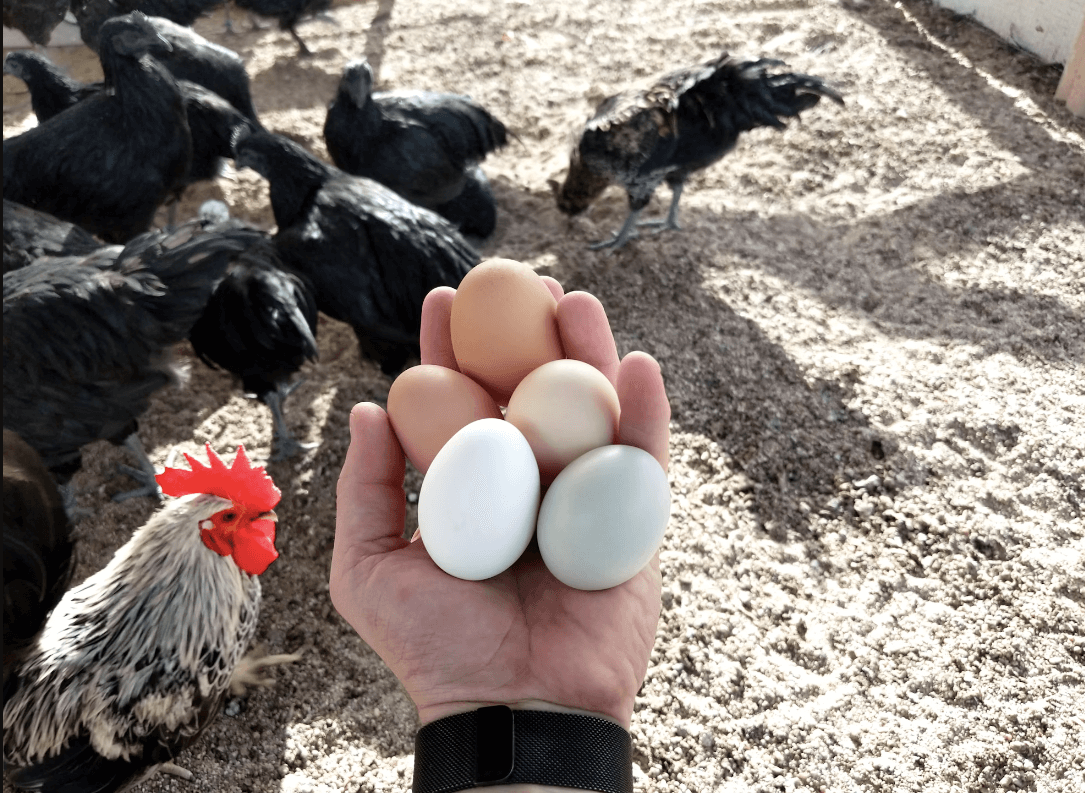Wry neck in chickens isn’t an illness, but rather a clinical term used to describe an abnormal head and neck position.
It can be very distressing to discover, particularly if you’re seeing it for the first time. However, most cases of wry neck are treatable if you catch them early enough and give your hens the proper care.
In this guide, we’ll provide some insights into wry neck in chickens, including its causes, treatments, and how to prevent it from happening. We’re here to help you ensure that your chicken coop remains healthy and alleviate any fears you may have about this complex condition.
Let’s get started.
What Is Wry Neck?
Wry neck—also called “stargazing” or “twisted neck” and medically known as Torticollis—is a neurological disorder affecting a chicken’s neck muscles. It causes the head to twist or tilt to one side.
A healthy chicken holds its head in an alert, upright position. Should you observe any other head or neck positioning, you could have cause for concern.
Birds that have the condition may display difficulty standing, and their necks often seem to be twisted around so it appears they are looking backwards or up to the sky.
They won’t be able to eat or drink properly or even move normally, and display general weakness and lethargy, sitting down or roosting more often than their flock mates.
Wry neck occurs most frequently in chicks, but it can be seen in chickens of all ages depending on the cause of the ailment. It’s not only distressing to your birds but to you as well, as it can be quite shocking to see your cluckers in this state.
What Causes Wry Neck in Chickens?
There are a number of reasons that cause wry neck in chickens. Let’s take a look at some of the affliction’s most common causes:
- Nutritional deficiencies: One of the leading reasons why chickens develop wry neck is due to a nutritional deficiency, particularly vitamin E and selenium. These nutrients have critical roles in maintaining proper muscle function and nerve health in your birds.
Should your flock receive medicated chicken feed for too long, it could inhibit their absorption and utilization of thiamine (vitamin B1). This nutrient deficiency may also result in the condition.
- Head injuries: Trauma to the head or neck due to an accident or attack by another animal can damage the nerves and muscles, which sometimes leads to wry neck.
- Genetics: Some breeds could be more susceptible to developing the affliction due to genetic factors. Birds like Silkies and Polish chickens have shown a higher incidence of wry neck due to their vaulted skulls, which make them vulnerable to head injuries.
- Infectious diseases: Certain infections, such as avian encephalomyelitis or Marek’s disease, affect the nervous system and display wry neck as a secondary symptom.
- Toxicity: Should your birds accidentally consume any toxic substances, such as lead or pesticides, it may result in neurological conditions like wry neck.
How to Treat Wry Neck
Once you’ve identified wry neck in your chicken you should take prompt action to treat the ailment and improve your bird’s quality of life.
The first step is to separate the affected bird from the rest of the flock to prevent it from becoming overwhelmed. Wry neck gets worse if the chicken is stressed, and its flock mates might unintentionally make things worse with pecking or bumping.
You’ll then need to increase the bird’s vitamin intake by giving it vitamin E, vitamin B, and selenium supplements to correct any nutritional deficiencies. Feed the chicken these nutrients 2–3 times each day along with their regular food and water until the symptoms improve.
During treatment, it’s likely that you’ll have to help the bird to eat and drink. Gently wrap it in a towel and bring its head near its feeder and waterer. If the chicken seems to be uncomfortable or in pain when you do this, you may have to spoon-feed it.
Wry neck won’t disappear immediately. You may see an improvement in the first 24 hours after giving your bird the vitamins, but it can take up to a full month before they reverse the condition completely.
The chicken’s symptoms may fluctuate and often get worse before they become any better. Even after you see an improvement in the ailment, keep giving the bird the supplements for up to two weeks to ensure its health is totally back to normal.
Contact your veterinarian should you feel that the affected hen needs anti-inflammatory medication to reduce pain and swelling. They can advise you on the proper dosages and the potential side effects that may occur.
If you identify an infection as the cause of your chicken’s wry neck, a veterinarian may prescribe antibiotics. The head and neck should return to a normal position once the illness has been treated.
How to Prevent Wry Neck in Chickens
Preventing wry neck in your flock is the best way to avoid having to deal with this unique affliction.
Because the condition is most commonly caused by deficiencies, it’s crucial to feed your flock a proper, nutritious diet.
Most chicken feeds do contain the proper nutrients and minerals that the birds need, but supplementing their diets with a few vitamin-enriched foods can go a long way in keeping them happy and healthy.
Consider offering your chickens the following nutritious treats along with their usual feed:
You should also always strive to maintain a clean and safe living environment for your birds. This reduces the risk of infection from bacteria, mites, or other parasites, as well as prevents any injuries that could cause wry neck.
Always ensure to handle your chickens gently to avoid trauma to their heads and necks, and regularly monitor them for any signs of illness or discomfort. Take prompt action if you notice anything unusual among your hens.
Keep Your Flock’s Health Ahead of the Rest
Seeing wry neck in one of your chickens can be quite distressing at first, but the situation is often not as bad as it seems. With proper care, most birds quickly recover from what has caused the ailment and go on to live clucking good lives.
Keep your backyard flock’s health ahead of the rest by staying proactive and providing your birds with a well-rounded, nutritious diet. Prevention is definitely better than cure when it comes to wry neck, and your birds will thank you for taking such great care of them.
Should you need any further guidance on how to care for your chickens, don’t hesitate to contact us. The Chicken Coop Company is always here to support you and your feathered friends.
Frequently Asked Questions About Wry Neck
Is Wry Neck Contagious?
Wry neck isn’t contagious as it’s not an illness. In most cases, the condition is a symptom of a vitamin deficiency and the affected bird can’t pass it on to other members of the flock.
However, if one of your chickens develops wry neck due to a lack of vitamin E or B1, you should review what you feed to all of your birds. The entire flock may need their diets supplemented to prevent any more cases of the ailment from occurring.
Can a Chicken Live With Wry Neck?
Yes, a chicken can live with wry neck, but the condition severely affects their quality of life if left untreated. It can cause difficulties in feeding, drinking, and moving around, which leads to decreased overall health.
However, with proper care, most birds with wry neck are able to make a full recovery and lead normal lives.
Will Wry Neck in Chickens Go Away on Its Own?
No, the disorder won’t go away by itself. Many cases of wry neck are caused by a vitamin E deficiency, and the condition will only be resolved once the affected bird receives enough of the nutrient.
For incidences of wry neck that are caused by head or neck trauma or genetics, the ailment might never go away.






